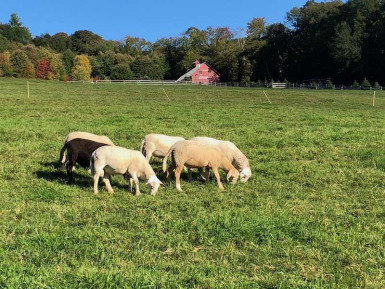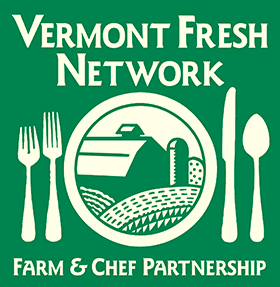From Grass to Table: VFN Sheep Farmers
 May 21, 2019
May 21, 2019
The Vermont Fresh Network has at least fifteen members that raise sheep for various reasons; six of these members have joined in the last year, with a desire to sell to restaurants. Raising sheep in Vermont is certainly not a new endeavor, however. According to the New England and Vermont Historical Societies, sheep were the craze in the 1800s in Vermont. Specifically, at the peak, there were millions of sheep, grazing our hillsides and necessitating the clearing of land and building of our quintessential rock walls. Merino sheep, originally brought from Spain for their superior wool, and others of this early sheep industry had a huge impact on Vermont as we know it today.
While the wool industry is no longer booming, several of our members pasture-raise lambs for meat. Sheep, like cows and other ruminants, eat grass - a lot of it. Usually, pastures (which are often hilly here in VT) are divided into sections called paddocks and the sheep are moved to new paddocks (fresh grass) frequently. There is a lot of knowledge, skill, and sweat involved in intensely rotating grazing animals. It isn’t as simple as turning them out to grass and then slaughtering them several months later. Not only do the animals need to be healthy, but so does the pasture, which is often why people who raise animals this way say they are grass farmers, first and foremost. The pasture needs to provide a nutrient-dense, well balanced diet for the animals. Many consumers, in turn, are choosing grassfed meat for personal nutrition and planet health. For more background about what grassfed means, read our previous article, Food Labels - Grassfed. Many are surprised by the mild flavor and tenderness of grassfed lamb (and mutton) and soon become converts!
Like any kind of farming, there is a lot that goes into successfully raising and marketing sheep. Some of our members share why they are passionate about sheep and other insights into their enterprises below.
Cloverworks Farm: Katie Sullivan
Cloverworks Farm in Albany specializes in pastured lamb and wool products. Katie Sullivan raises registered Bluefaced Leicesters and Border Leicesters. When we asked Katie what her favorite part of having sheep on her farm was, she said, “the pure joy of lambs discovering that their legs will let them jump and run. I love being a part of the whole of their lives.” She feels passionately about raising her own meat and shared that she was a vegetarian for about ten years before she found herself craving meat. “I wanted to eat meat from animals who lived lives behaving naturally and eating naturally. Since then, I've discovered the secret complexity of raising animals on grass. It's not as simple as "critters plus grass equals success.” Katie reports that the grass needs ruminants to thrive as much as ruminants need the grass. American grasslands were covered with buffalo for millennia before the cattle came. New studies show the potential for grazing animals to improve the grass and soil, sequestering carbon.
What do you want restaurants to know?
There is a lot of math that goes into deciding how to portion each animal: what areas to grind, which to save as roasts, which to keep as chops, what to put in sausage. That's why I need to know in advance if you want to feature shoulders or burger or chops.
What is your favorite recipe you make at home (with lamb)?
I secretly love the breast, which is a weird cut with a lot of bones and not as much meat. I barbecue it at low temperature and then enjoy the crispy, rendered fat.
Dana Forest Farm: Nicholas Laskovski
Dana Forest Farm in Waitsfield focuses on grass-fed lambs for meat and lambskins, rotational pasture management, and log-grown shiitake mushrooms. Nick Laskovski loves the multiple benefits that sheep provide, like keeping the pasture mowed and providing visual ambiance. The Laskovskis raise a small flock of Romney lambs and are very happy knowing everything that their lambs eat and drink.
What do you want restaurants to know?
Our lambs are raised with care and access to fresh pasture and clean mountain spring water.
What is your favorite recipe you make at home (with lamb)?
Lamb slider burgers
Flack Family Farm: Barbara and Doug Flack
Flack Family Farm in Fairfield is a diversified organic farm, producing grassfed beef and lamb, fermented vegetables, medicinal herbs, workshops & seminars, and their annual Raw Milk Theater. They love raising Icelandic sheep on their property for many reasons: they are beautiful, fill out the landscape nicely, are good grazers, they complement their herd of American Milking Devon cows, they smell good, and they offer many gifts - wool and lanolin, fleeces, and meat. The Icelandic breed does particularly well in the Vermont climate. The Flacks feel that naturally raised meat from animals on pasture is the only meat people should eat - it is very healthy and the fat is key to human health.

What do you want restaurants to know?
Our lambs are raised on pasture, hay, and minerals.
For nutrition information and benefits, the Flacks recommend checking out the Weston A. Price Foundation and for some great recipes, Sally Fallon's books, including Nourishing Traditions.
High Ridge Meadows: Mary and Jim Moran
High Ridge Meadows Farm in East Randolph is a family farm raising certified organic and grassfed beef and lamb, pastured chicken, eggs, maple syrup and produce, as well as yarn, roving, pelts and rugs. Owner, Mary Moran says, “We love raising sheep! They are sweet, docile (usually!) animals and I can’t imagine our farm without them. The best part of the year is lambing season. Hectic, sometimes stressful, but so exciting to see those new babies come into the world. It always amazes me how quickly the newborn lamb is up on its feet and looking for mother’s milk.” They raise both Icelandic and Katahdin breeds. They started off raising Icelandic sheep for their amazing hardiness, beautiful fleece, and delicious meat: “breed stock, fleece, and milk were our primary interests.” The meat was a necessary reality of raising sheep; their ram lambs are either sold as breeders or they are sent to slaughter. Icelandic lamb is mild flavored, lean and delicious! The Katahdins, as well, are raised for meat and breed stock and have a similar taste to Icelandic, mild and lean.
Mary says, “In our family, we like to eat meat. Grassfed meats are generally recognized as being a healthier alternative to grain fed and are higher in omega-3 fats which boost brain, heart, and immune function, and are lower in fat and calories. They are also higher in vitamin E and conjugated linoleic acid (CLA), which is said to have anti-cancer properties. We know they are enjoying clean pasture and water and living a natural life. It makes us happy to see our animals happy, out on pasture eating grass as ruminants are meant to do. They also keep our fields 'mown' and fertilized naturally, thus improving soil quality and the pasture grass itself. It’s a wonderful sustaining circle of life.”
What is your favorite recipe you make at home (with lamb)?
Our favorite grassfed lamb recipes are a Greek Moussaka and a Za’atar Sumac Rack of Lamb, both from Americanlamb.com.
Rebop Farm: Ashlyn & Abraham McClurg
Rebop Farm in Brattleboro is a diversified, pasture-based farm selling raw milk, maple syrup, pastured pork, lamb, veal, beef, chicken, rabbit, duck, turkey, and pick-your-own flowers and strawberries. Ashlyn and Abraham raise Katahdins, a hair sheep breed from Maine known for their hardiness, good fertility, and resistance to parasites, which they value as they’re always looking for ways to decrease the use of chemical wormers. Sheep are a wonderful part of the farming landscape in Vermont and a really wonderful part of the state’s history and geography. The McClurgs love everything about having sheep on their farm: “the flock mentality means they move as a group, and they worry about their friends being left behind if they get separated when moving from paddock to paddock. It’s so sweet. And their little lamby voices, and the wonderful smell of sheep.” The McClurgs note that sheep are incredible tools in reclaiming and managing weedy pasture, and that in a well managed grazing system their evenly scattered manure is so good for the pasture plants. They love their animals and their soil!
The McClurgs are deeply concerned about the impact of farming on soil, watersheds, animal welfare, and climate. Raising pastured meats is their answer to many of those concerns: “we are building soil carbon and fertility, giving animals as stress-free, happy and comfortable a life as we can, reducing runoff and nutrient leaching through responsible farming and grazing practices, and feeding our local community.” Here is an article they shared about why grassfed is better for us.
Abraham and Ashlyn note that lamb tends to cost more because sheep nutritional needs exceed those of beef, or even dairy cows. Sheep can eat up to 3.5% of their body weight in dry matter (hay, pasture, or grain), compared to beef (1.5%) and dairy cows (2.5%). That gets pretty costly in the winter time, which is why lamb chops cost a little more at the store.
What is your favorite recipe you make at home (with lamb)?
We love lamb shanks with white bean stew (a Chez Panisse classic). Here is something similar. We also eat lamb or mutton burgers a lot.
Sheep Meadow Farm: Jascha Pick
Sheep Meadow Farm (formerly Horsenettle Farm) in Danville is owned by Jascha Pick. He raises both Katahdin and Dorset breeds. His sheep are moved to fresh grass every day and he has been excited to see the land improving with grazing. Jascha says the Katahdin meat has good flavor and texture. His sheep are happy and healthy!
What do you want restaurants to know?
The farther out you can plan what you need, the better. Not being a huge company means that it can be months or even a year to plan out an increase in supply.

Is lamb on your menu? Contact these farmers for more information on their products - the flavor, texture, fat content, health benefits, pricing, and more.

